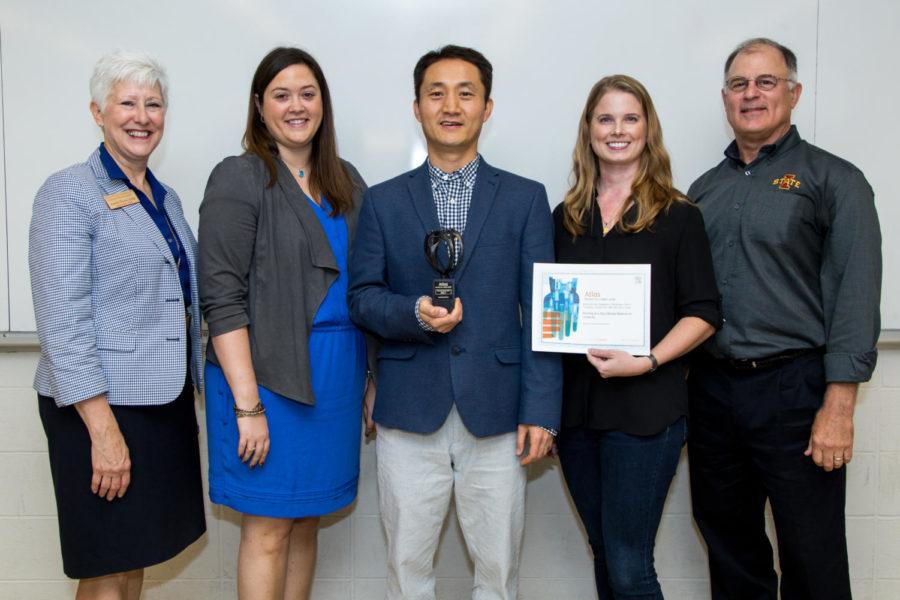Iowa State kinesiology team wins international research award
DC Lee (center) and Angelique Brellenthin (second right) are presented their award by Elsevier’s Heather Luciano (second left). Dean Laura Jolly (left) and kinesiology chair Phil Martin (right) also joined the presentation.
September 4, 2017
Research findings about running from an Iowa State University research team led to them winning an international award.
This study, published by Progress in Cardiovascular Diseases, was chosen for the Elsevier Atlas Award, a monthly international award. Each month, the winning article is selected from over 2,500 journals in health, science and technology. Atlas showcases research that could significantly impact people’s lives around the world or has already done so, according to their website.
The article showed the importance running has on many different lifestyles, and expanded on a 2014 study, co-authored by Duck-Chul “DC” Lee, associate professor in kinesiology. Lee also co-authored the Atlas Award-winning article.
The 2014 study showed that just 5-10 minutes of running per day can lead to health benefits. For example, leisure runners are expected to live three years longer than non-runners, or seven more hours for each hour spent running.
The research showed that running can reduce someone’s cardiovascular mortality rate by 45 percent. The research also showed running can decrease all health risks, such as heart attacks and strokes, by almost a third.
After the study was published in 2014, there were questions raised.
Lee worked with postdoc research associate Angelique Brellenthin to attempt to find answers, such as to the question of how much running was too much, or if there was such a thing.
“We found that less than one hour per week of running provided the maximum benefits compared to runners who ran three hours or more [per week],” Lee said. “Normally people think ‘If I run more, there will be bigger benefits.’ But we didn’t see that.”
The researchers found more surprises while writing the article.
“One thing that was surprising to me was that running appeared to be superior than other types of physical activity,” Brellenthin said. “Runners alone who were inactive in other types of activities had a larger reduction in their risk of death compared to others who were quite active in other activities but did not run.”
Something else unexpected from the study was winning the Atlas Award, Brellenthin said.
“I was excited,” Brellenthin said. “It was definitely an honor to be a part of a paper that received such good public attention and delivered a nice public health message.”
Although neither Lee nor Brellenthin were quite sure why their article was chosen, they each attributed it to the fact that running is so universal and the health benefits from it can reach a wide range of people all around the world.
“Running is a type of physical activity that anyone can do,” Lee said.
Lee plans to continue researching on the health effects of running. He also plans to begin a new research project with Brellenthin called CardioRACE.
In this study, Lee and his team will study the health differences in aerobic, resistance and a combination of the two exercises. The team will also compare the findings to people who do not exercise.
“At the moment we aren’t focusing on running and more focusing on getting this controlled trial off the ground,” Brellenthin said.







